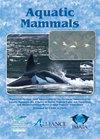The Killer Whale in the Caribbean Sea: An Updated Review of Its Ecology, Exploitation, and Interactions with Fisheries
IF 0.9
4区 生物学
Q4 MARINE & FRESHWATER BIOLOGY
引用次数: 2
Abstract
The killer whale (Orcinus orca) is a cosmopolitan cetacean distributed worldwide. Extensive studies have described its ecology and behavior across multiple polar and temperate regions. On the other hand, there is limited information on the distribution, ecological roles, and abundance of killer whales in tropical and subtropical regions. Herein, we build on previous work to update information on the spatiotemporal distribution, exploitation, and natural history of killer whales in the Caribbean Sea. We also document new records on their interaction with other species and human activities. We collated 385 records from the literature, online biodiversity information systems, the Internet (social networks and video-hosting websites), and citizen science-based initiatives. Records included sightings (87.3%), intentional captures (10.6%), bycatch (0.3%), and strandings (1.8%). Data primarily originated from research projects/activities (57%) and citizen science-based initiatives (43%). Records were distributed in the eastern Caribbean (39.5%), the southern Caribbean (19.7%), the Greater Antilles (19.2%), the Bahamian Region (13.0%), Central America (6.8%), and eastern Florida (1.8%). Killer whales were recorded year-round, but most data were reported between March and August (59.6%). The scarcity of records in Central America could reflect true lower densities in the region, lower observation effort, or a combination of the two. Because of the paucity of data, this study supports the growing importance of citizen-science initiatives to document the occurrence and ecology of this species in the Caribbean. Our dataset also confirms the occasional and widespread occurrence of killer whales throughout the Caribbean Sea. Potential low densities and limited predictability of their occurrence hinder dedicated research on this species.加勒比海虎鲸:对其生态学、开发利用及其与渔业相互作用的最新评述
虎鲸(Orcinus orca)是一种分布在世界各地的世界性鲸目动物。广泛的研究已经描述了它在多个极地和温带地区的生态和行为。另一方面,关于虎鲸在热带和亚热带地区的分布、生态作用和数量的信息有限。在此,我们在以往工作的基础上,更新了加勒比海虎鲸的时空分布、开发和自然历史信息。我们还记录了它们与其他物种和人类活动相互作用的新记录。我们从文献、在线生物多样性信息系统、互联网(社交网络和视频托管网站)和基于公民科学的倡议中整理了385条记录。记录包括目击(87.3%)、故意捕获(10.6%)、兼捕(0.3%)和搁浅(1.8%)。数据主要来自研究项目/活动(57%)和基于公民科学的倡议(43%)。记录分布在东加勒比海(39.5%)、南加勒比海(19.7%)、大安的列斯群岛(19.2%)、巴哈马地区(13.0%)、中美洲(6.8%)和佛罗里达东部(1.8%)。虎鲸全年都有记录,但大多数数据是在3月到8月之间报告的(59.6%)。中美洲记录的缺乏可能反映了该地区真正的低密度,低观测努力,或两者的结合。由于数据的缺乏,这项研究支持了公民科学倡议在加勒比地区记录这种物种的发生和生态的重要性。我们的数据集也证实了虎鲸在加勒比海偶尔和广泛出现。潜在的低密度和有限的可预测性阻碍了对该物种的专门研究。
本文章由计算机程序翻译,如有差异,请以英文原文为准。
求助全文
约1分钟内获得全文
求助全文
来源期刊

Aquatic Mammals
MARINE & FRESHWATER BIOLOGY-ZOOLOGY
CiteScore
1.60
自引率
16.70%
发文量
99
审稿时长
>12 weeks
期刊介绍:
Aquatic Mammals is a peer-reviewed journal sponsored by the European Association for Aquatic Mammals (EAAM), the Alliance of Marine Mammal Parks and Aquariums (AMMPA), and the International Marine Animal Trainers’ Association (IMATA). Aquatic Mammals publishes articles related to marine mammals (whales, dolphins, seals, fur seals, sea lions, walrus, dugongs, manatees, sea otters, and polar bears). Topics of publication on both captive animals and wild marine mammals include aspects of husbandry; behavior; conservation; veterinary medicine; anatomy; physiology; training; population trends; and the effects of pollution, climate change, and noise.
 求助内容:
求助内容: 应助结果提醒方式:
应助结果提醒方式:


